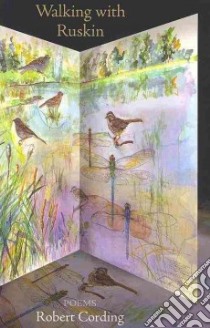Walking With Ruskin - 9781933880211
Un libro in lingua di Robert Cording edito da Univ Pr of New England, 2010
- € 14.80
- Il prezzo è variabile in funzione del cambio della valuta d’origine
The tradition from which Robert Cording's poems emanate is the rich borderland between spirit and religion, between nature and God, between suffering and redemption, between Wordsworth and Eliot. The wonder of Cording's work is how off-hand it seems---art-as-modesty and modesty-as-art. The humility at work here is genuine yet the dark questions about our time on earth remain. The answers are the poems themselves---equivocal yet powerful, resonant yet casual, calm yet fraught. To look human failing in the eyes and not blink is an achievement, to join praise in the same breath is very special---Baron Wormser
One takes on immitigable journey reading Walking With Ruskin by Robert Cording: the distance not far---a room a-neighborhood, a pond a mile off, a wood---but the sphere, the scope, is staggering. This is Dickinson meets Hardy meets Frost meets Yeats: vast emotional range; a deeply loving, empathetic gaze, stubborn exactitude and rigorous thought; and scattered everywhere about, the great contraries: life and death, light and darkness, song and silence, presence and absence, terror and ecstasy. While these traits of some of Cording's precursors are visible, the liquid ease with which the lier of material flows concordant with the lier of manner is his own doing. Like slipknnots being pulled faut, richly varied sentences always break concisely across the line: the reader never falls, and, when each poem concludes, he or she is left in a clearing with more, not less, to think about. To achieve, consistently, such resonant last chords, is true mastery---and generosity. Cording's years chasing fleet-footed Eloquence have paid off: again and again, he catches her, ---Gray Jacobik
In his poem, "The Marriage of Heaven and Hell," William Blake hypothesized that "If the doors of perception were cleansed everything would appear to man as it is, infinite." Of course, Blake's "doors of perception" are both hard to clean and even harder to keep clean. Walking with Ruskin looks at the difficulty of perception, of just how hard it is to simply "see" without asserting our own self-importance, self-needs, and self-justifications. For John Ruskin, the famous 19th century art and social critic, seeing demanded a scientist's respect for fact, but also a love for what was being seen. These poems ask us to attend, with devotion and care, to a world which will always remain a mystery, but a mystery in which love calls us to the things of this world where we may become most fully human.
Informazioni bibliografiche
- Titolo del Libro in lingua: Walking With Ruskin
- Autore: Robert Cording
- Editore: Univ Pr of New England
- Collana: Univ Pr of New England (Paperback)
- Data di Pubblicazione: 14 Settembre '10
- Genere: POETRY
- Pagine: 93
- ISBN-10: 193388021X
- EAN-13: 9781933880211


